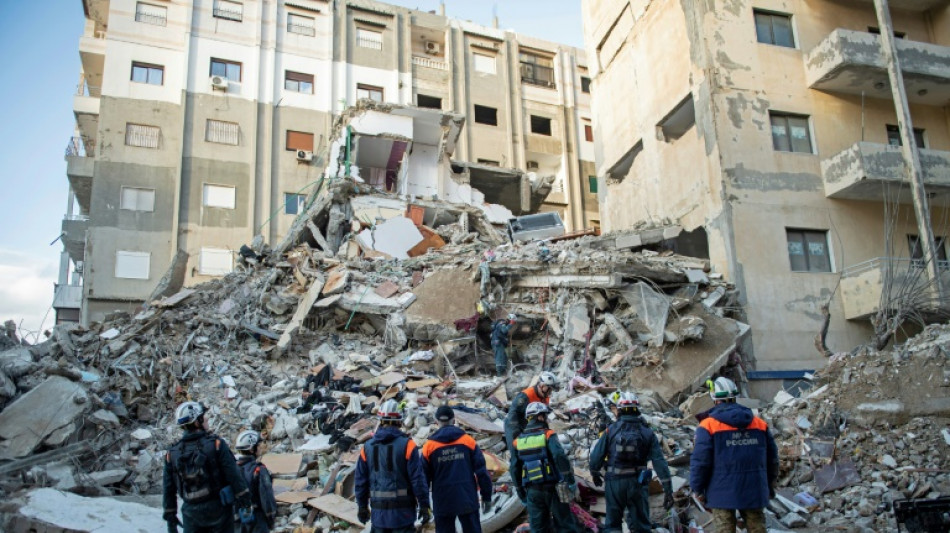
-
 Giannis triumphant in NBA return as Spurs win streak ends
Giannis triumphant in NBA return as Spurs win streak ends
-
How company bets on bitcoin can backfire

-
 Touadera on path to third presidential term as Central African Republic votes
Touadera on path to third presidential term as Central African Republic votes
-
'Acoustic hazard': Noise complaints spark Vietnam pickleball wars

-
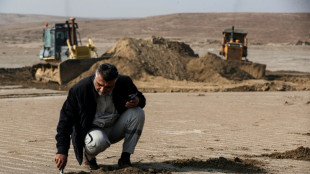 Iraqis cover soil with clay to curb sandstorms
Iraqis cover soil with clay to curb sandstorms
-
Australia's Head backs struggling opening partner Weatherald
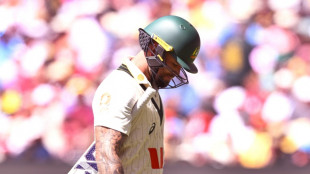
-
 'Make emitters responsible': Thailand's clean air activists
'Make emitters responsible': Thailand's clean air activists
-
Zelensky looks to close out Ukraine peace deal at Trump meet

-
 MCG curator in 'state of shock' after Ashes Test carnage
MCG curator in 'state of shock' after Ashes Test carnage
-
Texans edge Chargers to reach NFL playoffs

-
 Osimhen and Mane score as Nigeria win to qualify, Senegal draw
Osimhen and Mane score as Nigeria win to qualify, Senegal draw
-
Osimhen stars as Nigeria survive Tunisia rally to reach second round

-
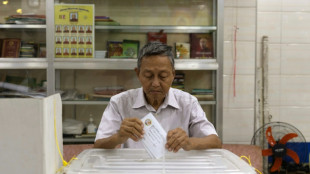 How Myanmar's junta-run vote works, and why it might not
How Myanmar's junta-run vote works, and why it might not
-
Watkins wants to sicken Arsenal-supporting family

-
 Arsenal hold off surging Man City, Villa as Wirtz ends drought
Arsenal hold off surging Man City, Villa as Wirtz ends drought
-
Late penalty miss denies Uganda AFCON win against Tanzania

-
 Watkins stretches Villa's winning streak at Chelsea
Watkins stretches Villa's winning streak at Chelsea
-
Zelensky stops in Canada en route to US as Russia pummels Ukraine
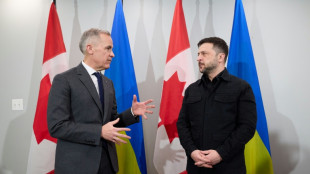
-
 Arteta salutes injury-hit Arsenal's survival spirit
Arteta salutes injury-hit Arsenal's survival spirit
-
Wirtz scores first Liverpool goal as Anfield remembers Jota

-
 Mane rescues AFCON draw for Senegal against DR Congo
Mane rescues AFCON draw for Senegal against DR Congo
-
Arsenal hold off surging Man City, Wirtz breaks Liverpool duck

-
 Arsenal ignore injury woes to retain top spot with win over Brighton
Arsenal ignore injury woes to retain top spot with win over Brighton
-
Sealed with a kiss: Guardiola revels in Cherki starring role

-
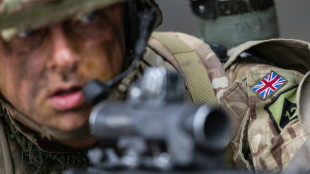 UK launches paid military gap-year scheme amid recruitment struggles
UK launches paid military gap-year scheme amid recruitment struggles
-
Jota's children join tributes as Liverpool, Wolves pay respects

-
 'Tired' Inoue beats Picasso by unanimous decision to end gruelling year
'Tired' Inoue beats Picasso by unanimous decision to end gruelling year
-
Thailand and Cambodia declare truce after weeks of clashes

-
 Netanyahu to meet Trump in US on Monday
Netanyahu to meet Trump in US on Monday
-
US strikes targeted IS militants, Lakurawa jihadists, Nigeria says

-
 Cherki stars in Man City win at Forest
Cherki stars in Man City win at Forest
-
Schwarz records maiden super-G success, Odermatt fourth

-
 Russia pummels Kyiv ahead of Zelensky's US visit
Russia pummels Kyiv ahead of Zelensky's US visit
-
Smith laments lack of runs after first Ashes home Test loss for 15 years

-
 Russian barrage on Kyiv kills one, leaves hundreds of thousands without power
Russian barrage on Kyiv kills one, leaves hundreds of thousands without power
-
Stokes, Smith agree two-day Tests not a good look after MCG carnage

-
 Stokes hails under-fire England's courage in 'really special' Test win
Stokes hails under-fire England's courage in 'really special' Test win
-
What they said as England win 4th Ashes Test - reaction

-
 Hong Kongers bid farewell to 'king of umbrellas'
Hong Kongers bid farewell to 'king of umbrellas'
-
England snap 15-year losing streak to win chaotic 4th Ashes Test

-
 Thailand and Cambodia agree to 'immediate' ceasefire
Thailand and Cambodia agree to 'immediate' ceasefire
-
Closing 10-0 run lifts Bulls over 76ers while Pistons fall

-
 England 77-2 at tea, need 98 more to win chaotic 4th Ashes Test
England 77-2 at tea, need 98 more to win chaotic 4th Ashes Test
-
Somalia, African nations denounce Israeli recognition of Somaliland

-
 England need 175 to win chaotic 4th Ashes Test
England need 175 to win chaotic 4th Ashes Test
-
Cricket Australia boss says short Tests 'bad for business' after MCG carnage

-
 Russia lashes out at Zelensky ahead of new Trump talks on Ukraine plan
Russia lashes out at Zelensky ahead of new Trump talks on Ukraine plan
-
Six Australia wickets fall as England fight back in 4th Ashes Test

-
 New to The Street Show #710 Airs Tonight at 6:30 PM EST on Bloomberg Television
New to The Street Show #710 Airs Tonight at 6:30 PM EST on Bloomberg Television
-
Dental Implant Financing and Insurance Options in Georgetown, TX


Why first 72 hours are crucial for Turkey-Syria quake rescues
Time was running out for survivors buried in the rubble of the earthquake in Turkey and Syria, as search efforts near the crucial 72-hour mark, a rescue response expert said Wednesday.
More than 90 percent of earthquake survivors are rescued within the first three days, said Ilan Kelman, a professor of disasters and health at University College London.
But that number can vary significantly depending on the weather, aftershocks and how quickly rescue teams and equipment can arrive at the scene -- all factors which are currently going against efforts in Turkey and Syria.
Over 11,200 people have been killed and thousands more injured after the earthquake struck southeastern Turkey and neighbouring Syria at 04:17 am (0117 GMT) on Monday.
With the 72-hour window closing early Thursday morning, Kelman told AFP why this timeframe is so important.
- Injuries, temperature, water -
"Generally, earthquakes do not kill people, collapsing infrastructure kills people," said Kelman, who has published research on quake rescue responses.
The most pressing factor is getting medical attention to people crushed under collapsed buildings before "their bodies fail" or they bleed out, he said.
Weather is also a key factor, and "it is completely against us" in Turkey and Syria, Kelman said.
The quake-hit regions have suffered through freezing temperatures as well as rain and snow since Monday.
"This very sadly means that hypothermia is possible, and people are probably unfortunately perishing due to the weather," Kelman said.
Those who do manage to survive the cold and their injuries still need food and water.
Without water, many people "will start dying at the three, four, five day mark," Kelman said.
Aftershocks, which hit without warning in the days after an earthquake, can further collapse buildings, posing "a huge and frightening risk" to both survivors and those trying to rescue them, he added.
The quake-hit regions have been shaken by relentless aftershocks, including a massive 7.5 magnitude tremor on Monday.
- Getting help to the scene -
Kelman said that normally "the vast majority of survivors are brought out within 24 hours by local teams, often using no more than their hands or a shovel."
Dozens of nations have pledged to send search and rescue teams as well as relief supplies to Turkey and Syria.
But the quake occurred in "a remote area, in a conflict zone, which is very difficult to get into," Kelman said.
It generally takes at least 24 hours for international rescue teams to arrive, get set up and start working.
"At that point, a good number of the people who could have survived have already perished," Kelman said.
For areas stricken by conflict near the Syrian border, access is trickier still.
"And as far as I've seen, rescue teams have not even fully assessed many of the areas in the main conflict zones, or many of the temporary settlements for displaced people," Kelman said.
- How to find survivors? -
Once on the scene, there are a range of ways that rescue teams can find earthquake survivors, including dogs which sniff through rubble.
A particularly famous team of quake rescue dogs from Mexico is on its way to Turkey, Kelman pointed out.
Robots and drones are also increasingly being used to get into small spaces too dangerous for humans.
Once a survivor is found, rescuers must decide how best to get them out.
Huge equipment such as cranes may be needed to lift slabs of collapsed buildings.
Or sometimes it is necessary to amputate a limb "which is crushed under a pillar or a piece of masonry," Kelman said.
- Before the 72 hours starts -
Kelman emphasised that "ultimately, a successful rescue operation starts decades before the earthquake to try to stop the infrastructure collapsing in the first place".
"If we would see levels of investment in disaster prevention that we are seeing in disaster response, we would not be in this situation."
S.F.Warren--AMWN



